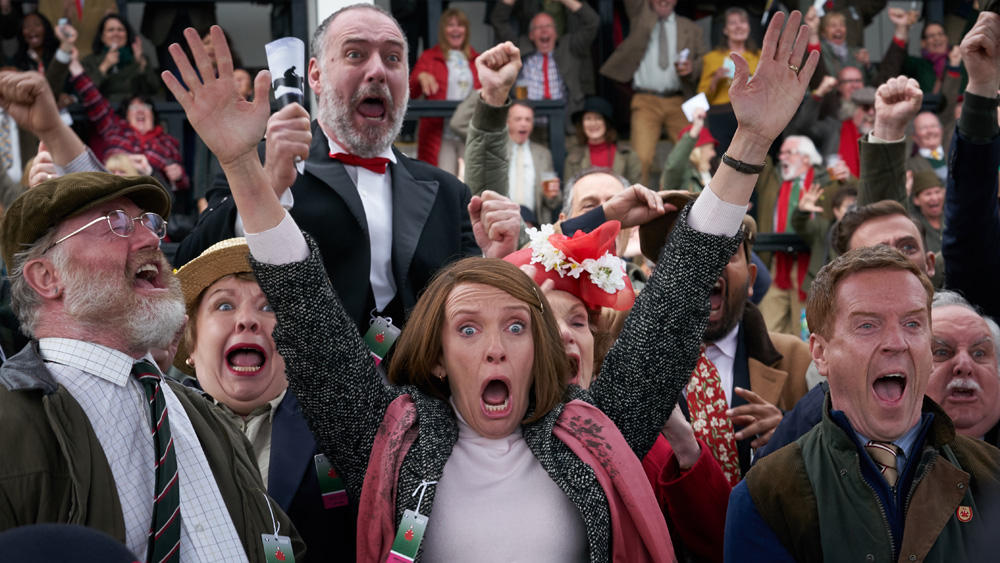‘Dream Horse’: Film Review
By Dennis Harvey
LOS ANGELES (Variety.com) – Louise Osmond’s 2015 Sundance audience winner “Dark Horse” was one of those documentaries that played like a crowdpleasing fiction, its real-life tale of underdog triumph had such a conventionally satisfying narrative arc. And indeed, the new “Dream Horse” proves that same material is indeed ready-made for dramatization.
Euros Lyn’s feature springs few true surprises within its familiar genre, one that U.K. filmmakers have specialized in at least since “The Full Monty.” Still, this is a well-cast, artfully handled effort that exercises sufficient restraint to really earn its requisite laughter and tears.
Toni Collette is in fine form as Jan Vokes, a middle-aged South Wales native whose life in declining former mining town Cefn Fforest has hit a seemingly permanent slump. Her children have left the nest, arthritic husband Brian (Owen Teale) mostly just parks himself in front of the telly, and her two jobs (bartending at the local social club/pub and cashiering at a big-box store) are joyless dead ends. She and Brian have always been keen on animals, each raising award-winning livestock from an early age. But currently they’re down to some geese, a lazy dog and the odd goat.
One day a newish patron at the pub, bragging about his purported glories as part of a racehorse investing syndicate, piques Jan’s interest. After doing some research, she informs the incredulous Brian that they’re buying a brood mare, then actually goes out and does it. The next thing is to draft local investors to fund the considerable costs of orchestrating insemination by a racing stallion, raising the offspring, training, et al., with only the remotest chance of arriving at a winning competitor.
First to rain on her parade is Howard (Damian Lewis), the pub braggart, a tax accountant who’s taken aback by the very idea that some working-class folk would venture into terrain almost exclusively trod by “wealthy professional men.” But he’s won over by her enthusiasm. And so, eventually, are a motley crew of locals ranging from some of Howard’s white-collar workmates to a butcher, a fusspot, a lonely old widow (Sian Phillips), and the village souse (Karl Johnson).
A foal is duly born, dubbed Dream Alliance for its owners’ organization and whimsical hopes. Upon reaching maturity, it manages against odds to get accepted provisionally by a world-class trainer (Nicholas Farrell) — despite a somewhat worrying temperament that can flare at inopportune moments, such as at the starting gate of a race.
There are rather predictable speed bumps of conflict and crisis, not just on the track but between Jan and Brian in a simple story whose steady path seems destined toward an exultant finale. Lyn, a TV veteran who’s directed a few, low-profile theatrical features, manages to downplay the more obvious notes, even when Neil McKay’s crisply engineered but sometimes on-the-nose screenplay hits them head-on. Nothing is pushed too hard, including the atmosphere of economic depression. As a result, the expansive-feeling “” ends up a genuinely rousing entertainment rather than yet another manipulative feel-good film of the sort that have cluttered British cinema since “Monty.”
It helps, of course, that the racing scenes are well handled, with particular suspenseful attention to the threat of injury in steeplechase events, as horses barely clear a hurdle. The packaging in general is first-rate, taking full advantage of local flavor (and landscapes) in DP Erik Alexander Wilson’s handsome widescreen imagery.
Benjamin Woodgates’ engaging original score mixes accordion-based folksiness and orchestral urgency. But the film is dominated to an even larger degree by a host of songs associated with Welsh acts (Super Furry Animals, Tom Jones, Manic Street Preachers, etc.) that are variously heard in their original form or sung by characters much inclined toward karaoke and group sing-alongs. (During closing credits, the real people these actors play join them to sing Jones’ “Delilah.”)
Collette easily carries the film’s emotional weight as a woman of very ordinary circumstances who needs something extraordinary in her life to give it hope and purpose. But almost equal emphasis is given to the excellent Lewis, whose struggling yuppie Howard is in a similar fix, complicated by the fact that he nearly lost his home and wife (Joanna Page) in a financially disastrous prior racehorse alliance. The support turns are colorful without going over-the-top.

